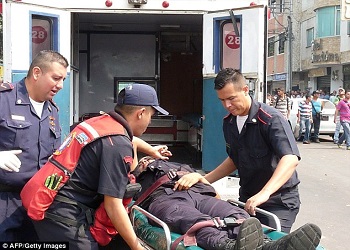More than one police officer or military soldier was killed per day in Venezuela in 2016, a figure that highlights the steadily degrading security situation for which recent government policies may be largely to blame.
The year 2016 witnessed the highest number of murdered security forces in the past five years with 414 cases, according to a report by the human rights group Foundation for Due Process (Fundación para el Debido Proceso – FUNDEPRO).
The study was published in January 2017, and it compiled data from news coverage and interviews with security forces.
Out of the 414 homicides, 291 were police, 93 were military, and the remaining 30 were bodyguards. The total figure includes the deaths on duty and off but not the incidents of officers that died while allegedly committing criminal acts.
The report notes that the main motive behind the killings was the theft of service weapons or vehicles, and that the state with the highest number of recorded incidents was Miranda along the northern coastline, with 83 killed.
The report argues that combined with the additional 26 attacks against police and military stations, the killings indicate “a contempt and lack of respect towards figures of authority.”
InSight Crime Analysis
The data concerning the murders of security forces is the latest example of how failed government security policies are fueling Venezuela’s downward spiral of violence.
Based on 2016 statistics, the country was one of the most violent in the world, with estimates reaching nearly 30,000 homicides. Security forces and the judiciary are so overwhelmed that lynchings increased by 650 percent last year, and the impunity rate for homicides hovers at 92 percent, according to data from the Attorney General’s Office. The general security situation certainly does not provide a safe working environment for police and military patrolling the streets.
But killings of security elements may have been exacerbated by government measures that have degraded the public’s perception of security forces. Venezuela, for example, is seeing growing outrage against the infamous Operation Liberation and Protection of the People (Operación de Liberación y Protección del Pueblo – OLP). The security strategy has led to a spate of accusations of extrajudicial killings and human rights abuses by law enforcement and death squads working hand in hand, fueling public resentment toward security forces.
Meanwhile, President Nicolás Maduro’s administration has increasingly armed civilian groups as part of its security strategy. By doing so, the government is effectively undermining the monopoly of security forces on violence.
SEE ALSO: Venezuela News and Profiles
Moreover, some civilian armed groups designed to protect people from crime, such as the so-called “colectivos,” have become increasingly involved in criminal activities themselves.
A similar policy has led to the creation of the “peace zones” where the government allowed for security forces to be replaced by vigilantes. In reality, these areas have become safe havens for organized crime and no-go zones for security elements. Incidentally, Miranda, the state with the highest number of killed security elements in 2016, is also an area with a high concentration of peace zones.
Early January 2017, Maduro announced that the government would supply more weapons to civilians as part of a new security strategy, an indication that the administration has no intention to alter its course of action.

